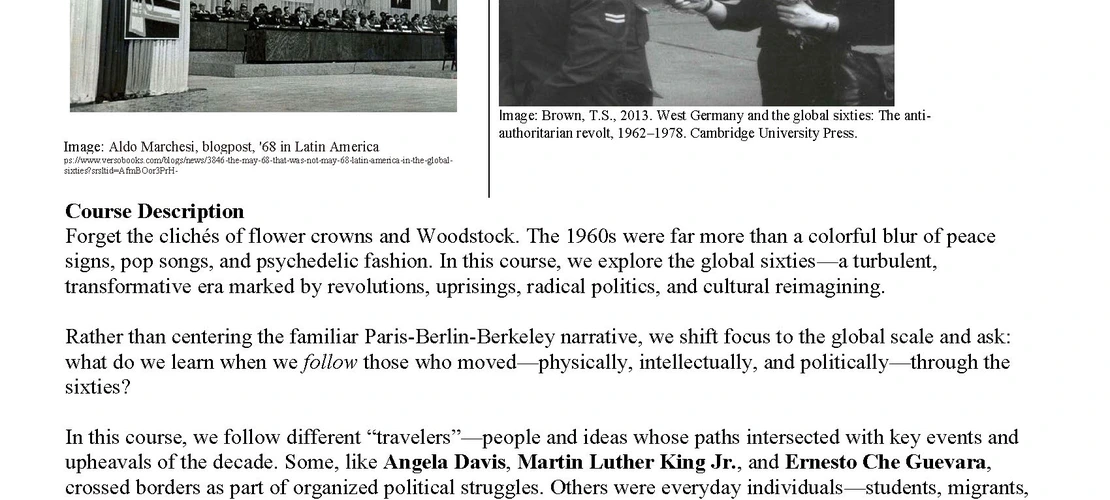Check out a few of our upcoming history courses...
Highlighted Fall 2025 Courses
HIST 356
Global Environmental History
Instructor: Prof. Gregory Cushman
T/Th 3:30-4:45
Nature is our oldest home and our newest challenge. This course surveys the environmental history of planet earth and its peoples over the very long term, from the Big Bang up to the human dominated present, the Anthropocene. It focuses on scientific and historical debates regarding environmental change and biotic exchange in world history. Although global in scope, this course will give particular attention to case studies from Latin America, the Caribbean, and the Pacific World.
HIST 231
Music, Race, & American Cultural History, 1900-present
Instructor: Dr. Tyina Steptoe
T/Th 2-3:15
HIST 231 is a cultural history course that explores the role of music in community-building and movements for racial justice. By historicizing the development of diverse musical styles (such as ragtime, corridos, blues, gospel, jazz, rock, soul, salsa, Tejano, and punk), we will examine the relationship between popular culture, politics, and social change.
HIST 280
Sports & Ethnic America
Instructor: Dr. Matthew S. Gilbert
Online
This social history course examines racial, ethnic, and gender history in the U.S. through the lens of sport from the turn of the twentieth century through the present. May include themes such as: Native American boarding schools, Japanese American internment and World War II; racial segregation and integration; Cold War nationalism and steroids; immigration and Americanization; 1960s political activism; sexuality and sport; Title IX and sexism; "melting pot" themes; Native American mascot controversies; mixed-race athletes and identity.
HIST 478a
Revolution, Resistance, and the Global Sixties
Instructor: Dr. Jadwiga Pieper-Mooney
Online
In popular imagination, the world of the 1960s has often been romanticized, depicted as a decade of positive change where youth activism and student protests contributed new ideas and actions for more justice, equality, and happiness (the latter, at times, enhanced by drugs). This nostalgic vision is consistently shaped through the prism of the Western world—namely Europe and the United States.
In this course, we will follow activists and global travelers to different places around the globe – thus decentering the familiar stories and challenging the rosy image of the 1960s. We will discuss the “long” global sixties as a decade in which individuals, groups, and nations around the globe became part of political struggles of an extraordinary intensity. How can we best understand the power of individuals or groups to change political systems, to shape political cultures, or to resist the ill-effects of political systems that appear to determine the choices they can make? How have individuals or groups used their power, and under what circumstances have they remained silent observers, or become disruptive participants in peaceful or armed resistance and the mobilization for change?
We will pay special attention to the circulation of ideas and to emerging political relationships that transcended the boundaries of nation-states and overcame geographical distance. We will treat such themes as anti-fascism, anti-imperialism, anti-colonialism, socialist internationalism, and feminism. We will also ask how new understandings of rights – including civil rights and women’s rights – help explain some of the unprecedented political projects that brought together people from different parts of the world, and that linked mobilization strategies of peoples across continents
HIST 403a
History of Greece: Democracy, War, and Empire
Instructor: Dr. John Senseney
M/W 2-3:15
Those intrigued by the pursuit of history, the natures of democracy and empire, classical culture, or the ancient heritage of the Middle East will emerge from this course with a burgeoning fascination with all these interrelated topics. Through Greek and Persian sources and perspectives, we explore the birth of historical inquiry in a mixed Persian and Greek cultural context, as well as its subsequent Athenian development as a high-stakes pursuit in contested notions of democracy and Greek v. foreign identity. We critically examine how the newly created pursuit of history related to the military conflicts, myths, political thought, arts, and sciences that came to define “western v. eastern” cultures in the pivotal period from the Persian through Peloponnesian wars. Students will gain a tangible sense of the resulting world that individuals and institutions have fought for and against from ancient times to the present.



